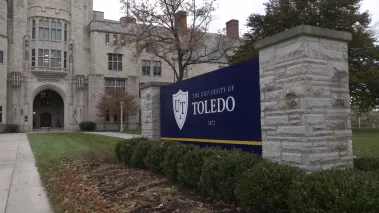Table of Contents
After FIRE’s intervention, University of Toledo won’t require faculty, students to use ‘chosen first names’

Shutterstock.com
Following multiple letters from FIRE, the University of Toledo nixed a proposed requirement that faculty and students use individuals’ “chosen first names” in all communications that occur on campus or in university programs and activities. The university’s newly adopted “Inclusive Gender Practices” policy avoids this constitutional defect because it instead merely recommends — but does not require — the use of chosen first names.
FIRE first wrote to UToledo in February criticizing the proposed policy. While unobjectionable from a First Amendment perspective in some respects — the policy encouraged students and faculty members to use others’ preferred pronouns, and identified ways for UToledo community members to register their chosen first names with the university — the proposed policy would also have mandated students and faculty refer to others by their chosen first names in “all communications” that occur “in University programs and activities, on University property or at University sponsored events.”
While persistently calling someone by their non-preferred first name could rise to the level of discriminatory harassment, that is a high bar not met by mere offense or discomfort.
The broad sweep of the proposed policy would reach personal emails, social media posts, student newspaper articles, and private conversations. It would even apply to communications that refer to a third party outside of the conversation without using their chosen first name.
FIRE told UToledo that as a public university, it generally cannot regulate student expression based on its content or message unless it falls into an established First Amendment exception. While persistently calling someone by their non-preferred first name could rise to the level of discriminatory harassment, that is a high bar not met by mere offense or discomfort. We also explained that the proposed policy was overbroad with respect to faculty extramural speech, as the university “can no more bar faculty from ever using an individual’s legal first name than it could forbid them from referring to administrators as ‘Big Brother.’”
Even concerning in-class speech, the proposed policy raised First Amendment issues in light of the decision in Meriwether v. Hartop by the U.S. Court of Appeals for the Sixth Circuit, whose decisions are binding on UToledo. In that case, the court reinstated a professor’s First Amendment lawsuit against Shawnee State University, which had punished him for refusing to use a student’s preferred pronouns. The court rejected Shawnee State’s argument that the professor’s refusal required the university to take action under Title IX, finding “no indication” that doing so “inhibited [the student’s] education or ability to succeed in the classroom.” The court also noted the professor’s First Amendment interests were “especially strong” because titles and pronouns carry an ideological message with which faculty may disagree, and Shawnee State’s pronoun policy potentially compelled speech on a matter of public concern.
UToledo did not respond to FIRE’s letter, prompting us to send a second letter urging the university not to implement the unconstitutional policy. UToledo didn’t respond to our second letter, either. But when it implemented the policy in September, it incorporated some of our recommendations. The revised policy said: “It is strongly recommended that an individual’s Chosen First Name be used by all UToledo students, staff, and faculty in all communications.” This replaced the originally proposed language: “An individual’s Chosen First Name must be used by all UToledo students, staff, and faculty in all communications.”
FIRE commends UToledo for bringing this policy in line with its First Amendment obligations.
However, we noticed that another portion of the policy made the use of chosen first names mandatory: “In instances where legal name is required within University Systems, including official transcripts, tax forms, payroll, and financial aid, the individual’s Chosen First Name must be used in verbal communication.” FIRE wrote again to UToledo on Nov. 4 urging it to remedy this apparent error. Soon after, UToledo changed the policy to eliminate this inconsistency. Now, no part of the policy mandates the use of chosen first names.
Overbroad policies like the original iteration of the “Inclusive Gender Practices” policy leave room for universities to punish constitutionally protected expression. FIRE commends UToledo for bringing this policy in line with its First Amendment obligations.
FIRE defends the rights of students and faculty members — no matter their views — at public and private universities and colleges in the United States. If you are a student or a faculty member facing investigation or punishment for your speech, submit your case to FIRE today. If you’re faculty member at a public college or university, call the Faculty Legal Defense Fund 24-hour hotline at 254-500-FLDF (3533).
Recent Articles
FIRE’s award-winning Newsdesk covers the free speech news you need to stay informed.

FIRE statement on immigration judge’s ruling that deportation of Mahmoud Khalil can proceed

FIRE welcomes Allison Hayward to board of directors

‘Executive Watch’: The breadth and depth of the Trump administration’s threat to the First Amendment — First Amendment News 465


